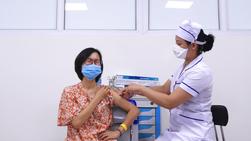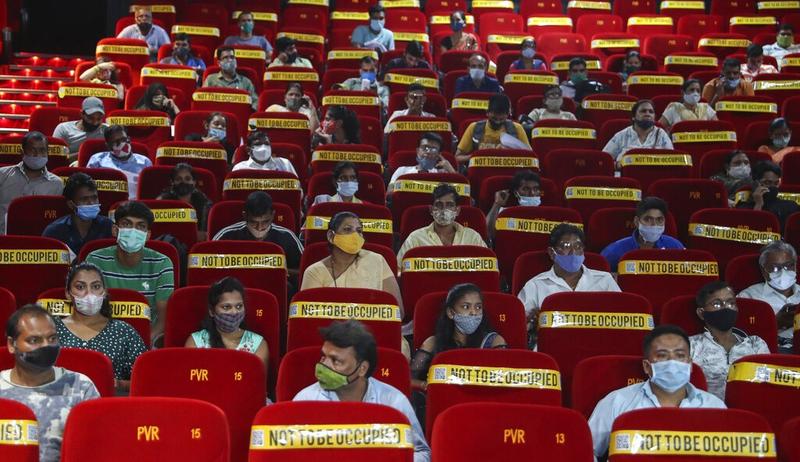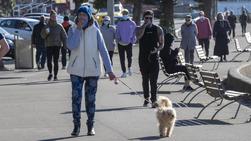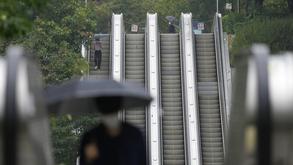 A woman receives a shot of AstraZeneca COVID-19 vaccine in Hanoi, Vietnam Sunday, June 27, 2021. (HAU DINH / AP)
A woman receives a shot of AstraZeneca COVID-19 vaccine in Hanoi, Vietnam Sunday, June 27, 2021. (HAU DINH / AP)
JAKARTA / PHNOM PENH / ISTANBUL / TEHRAN / ANKARA / VIENTIANE / NEW DELHI / SEOUL / ISLAMABAD / TOKYO / HANOI - Vietnam's health ministry will offer the coronavirus vaccine jointly developed by Pfizer and BioNTech as a second dose option for people first inoculated with the Moderna vaccine, state media reported on Wednesday.
The ministry had approved the mixed regimen, which is due to low supplies of the Moderna vaccine. Both vaccines are of the Messenger RNA type.
Vietnam reported 12,680 new COVID-19 cases on Wednesday, including 12,663 locally transmitted and 17 imported, the ministry said.
The new infections brought the country's total tally to 563,676, with 14,135 deaths, the ministry said.
Most of the community cases were detected in southern localities, including 7,308 in the epicenter Ho Chi Minh City, 3,172 in nearby Binh Duong province, and 814 in Dong Nai province.
As many as 325,647 COVID-19 patients have so far recovered, up 13,937 from Tuesday, while over 23.5 million doses of COVID-19 vaccines have been administered nationwide, according to the ministry.
As of Wednesday, Vietnam has registered a total of 559,346 locally transmitted COVID-19 cases since the start of the current wave in late April, the ministry said.
The ministry is also considering relaxing travel restrictions for fully vaccinated people on a trial basis in some unspecified southern localities, the government website reported.
Separately, Ho Chi Minh City plans green cards for vaccinated residents and will ease social distancing curbs for those partially and fully inoculated, Tuoi Tre reported, citing the city’s mayor.
Australia
Three-quarters of people over the age of 16 in Australia's New South Wales (NSW) have now had at least their first vaccination dose, the state reported on Wednesday, along with the first rise in new infections in three days.
Australia has locked down Sydney and Melbourne, its largest cities, after outbreaks from the highly infectious Delta variant in June ended months of little or no community transmission.
The country now aims to live with, rather than eliminate, the virus once it achieves broad vaccine coverage of about 70 percent of its adult population of 20.6 million, a goal it is expected to reach by early November based on current rates.
New South Wales reported 1,480 locally acquired cases, up from 1,220 a day earlier, while cases in neighbouring Victoria dipped to 221 from 246.
Nine new deaths were recorded but rising vaccination levels among the most vulnerable mean the mortality rate of the current outbreak is 0.41 percent, data shows, below previous outbreaks.
Cambodia
The World Health Organization (WHO) office in Cambodia on Tuesday called on people to continue caution although the Southeast Asian nation has seen a success in its vaccination drive.
"Cambodia is in a new phase of the pandemic in which decreasing case numbers, high vaccination coverage, and a more transmissible circulating variant threaten a hidden surge," said a WHO-Cambodia's press statement.
The kingdom confirmed 511 new COVID-19 cases on Tuesday, raising the national total caseload to 96,339, the Ministry of Health (MoH) said, adding that 11 more fatalities were reported, bringing the death toll to 1,981 so far.
"The daily reported numbers of both cases and deaths have been declining for several weeks, and the declines have been reported across most provinces," according to the statement, adding that as cases have decreased, the vaccination coverage has increased.
Most of the vaccines used in the country's immunization program are China's Sinovac and Sinopharm.
WHO representative to Cambodia Li Ailan said although the data indicated an improving situation, the risk of a surge of COVID-19 is very high, adding that like many countries, Cambodia has been racing against more transmissible variants throughout 2021.
 People wait to get inoculated against COVID-19 at a cinema hall in Mumbai, India on Aug 17, 2021. (RAFIQ MAQBOOL / AP)
People wait to get inoculated against COVID-19 at a cinema hall in Mumbai, India on Aug 17, 2021. (RAFIQ MAQBOOL / AP)
India
India's COVID-19 tally rose to 33,096,718 on Wednesday, as 37,875 new cases were registered during the past 24 hours across the country, showed the federal health ministry's latest data.
As many as 369 deaths due to the pandemic since Tuesday morning took the total death toll to 441,411.
ALSO READ: Asia's factories hit by pandemic-related supply disruptions
Indonesia
Indonesia has issued emergency use authorization for COVID-19 vaccines made by
Biologics Inc and Johnson & Johnson, Bisnis Indonesia reported, citing the food and drug regulator.
Both shots will be administered to people aged 18 years and older.
The Indonesian government has targeted to inoculate 70 percent of the country's population with COVID-19 by the end of this year, Indonesian President Joko Widodo said Tuesday.
"We want at least 70 percent of the population in all the provinces to be vaccinated by the end of this year," Widodo said.
As many as 189.94 million people represent 70 percent of the Indonesian population totaling 271.35 million.
Indonesia is targeting to administer COVID-19 vaccinations to 208.26 million people, an increase compared to the previous target of 181.5 million people after the inoculation coverage included children aged 12 to 17 years old.
If 70 percent of the people receive injections of the COVID-19 vaccines, herd immunity is expected to be formed and the transmission of the coronavirus will slow down, Widodo said.
Iran
Iran's health ministry on Wednesday reported 26,854 new COVID-19 cases, taking the country's total infections to 5,210,978.
The pandemic has so far claimed 112,430 lives in the country, after 538 new deaths were registered in the past 24 hours, said the update by Iran's Ministry of Health and Medical Education.
A total of 4,453,651 people have recovered from the disease or been discharged from hospitals across the country, while 7,534 remain in intensive care units, according to the ministry.
By Wednesday, 20,558,038 people have received at least a dose of a coronavirus vaccine in the country, while 10,892,656 have taken two doses.
Iran has been recently facing a resurgence of Delta variant of the coronavirus.
Japan
Japan decided on Wednesday to extend the COVID-19 state of emergency in 19 prefectures to Sept 30, which is now covering 21 of 47 prefectures as of Sept 12.
For the Miyagi and Okayama prefectures, the state of emergency was altered to a quasi-state of emergency.
Under the state of emergency, restaurants and bars serving alcohol or offering karaoke services are asked to shut during the period while the government provides money for compliance. Those not serving liquor are requested to close at 8 p.m. as well and easing the alcohol ban is not allowed during the period.
Separately, Japan’s health ministry is planning to hold a panel meeting later this month to decide whether to approve GlaxoSmithKline Plc’s and Vir Biotechnology Inc’s COVID-19 antibody drug Sotrovimab, broadcaster NHK reported, citing an unidentified person.
If approved, it will be the second drug that can be used to treat patients with mild symptoms in Japan.
Laos
Pharmaceutical producers in Laos are to begin the production of herbal treatments for COVID-19 in capsule form.
Director General of the Department of Communicable Disease Control under the Lao Ministry of Health, Rattanaxay Phetsouvanh, told a press conference in Lao capital Vientiane on Tuesday that Laos' Institute of Traditional Medicine (ITM) has researched the process of producing herbal medications in capsule form, which are now being used to treat patients infected with COVID-19.
"Medical personnel in Laos are already treating some 450 COVID-19 patients using herbal medicine capsules in the provinces of Champasak and Savannakhet," said Rattanaxay.
"Herbal medicine has been seen to be effective in the treatment of respiratory diseases, particularly the COVID-19," he added.
The Lao Ministry of Health on Tuesday reported 221 more imported COVID-19 cases and 86 new locally transmitted cases, bringing the total number of coronavirus infections to 16,365.
Malaysia
Malaysia reported another 19,733 new COVID-19 infections, the Health Ministry said on Wednesday, bringing the national total to 1,900,467.
Health Ministry Director-General Noor Hisham Abdullah said in a press statement that three of the new cases are imported and 19,730 are local transmissions.
Another 361 deaths have been reported, bringing the death toll to 19,163.
Some 22,701 patients have been released after recovery, bringing the total number of cured and discharged to 1,632,631 or 85.9 percent of all cases.
Of the remaining 248,673 active cases, 904 are being held in intensive care and 430 of those are in need of assisted breathing.
The country reported 326,476 doses administered on Tuesday alone and some 63.7 percent of the population have received at least one dose and 49.9 percent are fully vaccinated.
Meanwhile, the East Coast Rail Link (ECRL), Malaysia's mega rail project jointly constructed with a Chinese contractor, has completed the vaccination of all its personnel with at least one dose of COVID-19 vaccines.
The ECRL's main contractor China Communications Construction Company (CCCC) said Wednesday in a statement that all the staff are expected to be fully vaccinated by the end of September this year.
"This is to ensure the personnel actively working at its 164 priority locations, including the excavation works of 10 tunnels, are fully immunized and to ensure the steadfast progress of the national megaproject," it said.
Mohd Fauzi Hassan, person-in-charge from Qualitas Health Group, the healthcare organizer of this vaccination drive, said it is crucial for the project to vaccinate its own staff, as well as relevant subcontractors and suppliers.
"It is our honor to be able to participate in one of Malaysia's mega projects by vaccinating the workforce behind the ECRL project. It is crucial to vaccinate not only its own staff but also those of their subcontractors as well as suppliers, to ensure a safe working environment for all," he said.
The vaccination campaign was approved by the Public-Private Partnership COVID-19 Industry Immunization Program and carried out at the ECRL Dungun and Chukai Base Camps in Terengganu state, and the Pahang Construction Industry Development Board (CIDB) in Pahang state in August and September.
Meanwhile, for employees within the Klang Valley, vaccinations were carried out earlier in July and August under the construction industry vaccination program at the CIDB Convention Center in Kuala Lumpur.
The ECRL runs from Malaysia's largest transport hub Port Klang and travels across the peninsula to Kelantan state in northeastern Malaysia.
The mega railway project is expected to greatly enhance connectivity and bring more balanced growth to the country, by linking its less-developed region on the East Coast to the economic heartland on the West Coast upon its completion in 2026.
 People, some wearing masks, walk along a path in Wellington, New Zealand, Aug 19, 2021. (MARK MITCHELL / NEW ZEALAND HERALD VIA AP)
People, some wearing masks, walk along a path in Wellington, New Zealand, Aug 19, 2021. (MARK MITCHELL / NEW ZEALAND HERALD VIA AP)
New Zealand
New Zealand reported a further fall in locally acquired COVID-19 cases on Wednesday, as the largely coronavirus-free nation looks to eradicate an outbreak of the highly infectious Delta variant.
New Zealand reported 15 new locally acquired cases of COVID-19, down from 21 a day earlier, on the first day of an easing of tough restrictions in all regions outside its largest city Auckland.
Daily infections hit a peak of 85 on Aug 29. All of the latest cases were in Auckland.
Officials earlier this week said schools, offices and businesses can reopen outside Auckland from Wednesday after near zero cases in the rest of the country, but there will be a cap on gatherings and masks will remain mandatory in public venues.
New Zealand had been largely virus-free, excluding a small cluster of cases in February, until an infected traveller from Australia seeded an outbreak, forcing officials to impose a national lockdown last month.
About 1.7 million people in Auckland, the epicenter of the outbreak, will be in hard lockdown until at least Sept 14.
Pakistan
Pakistan on Tuesday reported 3,902 new COVID-19 cases, the National Command and Operation Center (NCOC) said on Wednesday.
The NCOC said that the country's number of overall confirmed cases had risen to 1,190,136, including 1,071,976 who have recovered.
The number of active cases has dropped to 91,747 who are under treatment across the country, including 5,389 in critical situation.
Saudi Arabia
Saudi Arabia lifted a travel ban to neighboring United Arab Emirates starting Wednesday, opening up a key market weeks ahead of the Dubai Expo 2020 trade fair.
The lifting of restrictions, which also included resumption of travel to South Africa and Argentina, came a day after Saudi Crown Prince Mohammed bin Salman spoke to de facto UAE leader, Abu Dhabi Crown Prince Mohammed bin Zayed.
The two discussed “the prospects of further consolidating the strategic cooperation” between the nations.
The move will come as a boost for the delayed Expo 2020 event, which Dubai has been preparing for a decade. Saudi Arabia was the second-biggest source of tourists to Dubai in 2020 after India, according to Dubai Tourism.
Dubai is targeting 25 million visits to the six-month event, which kicks off next month and is expected to generate billions of dollars for the government. It will be one of the biggest in-person events since the start of the pandemic.
The Saudi travel ban has been in place since July. That dealt a blow to Dubai, a popular weekend getaway for those looking for cheap shopping and lax social restrictions. Saudis flouting the rules faced a three-year travel ban.
The kingdom cited coronavirus-related precautions for the ban, but the move came amid increased rivalry between Saudi Arabia and the UAE.
Daily coronavirus cases in the UAE have been dropping steadily over the past month, falling below 1,000 toward the end of August.
 People wearing face masks to help curb the spread of the coronavirus use the escalators near the subway station in Seoul, South Korea on Aug 31, 2021. (LEE JIN-MAN / AP)
People wearing face masks to help curb the spread of the coronavirus use the escalators near the subway station in Seoul, South Korea on Aug 31, 2021. (LEE JIN-MAN / AP)
South Korea
South Korea is drawing up a plan on how to live more normally with COVID-19, expecting 80 percent of adults to be fully vaccinated by late October, health authorities said on Wednesday.
The country is in the middle of its worst wave of infections, but it has kept the number of severely ill cases under control through steadily rising vaccination rates.
"We'll review measures that will allow us to live more normally, but any such switch will be implemented only when we achieve high vaccination rates and overall (COVID-19) situations stabilize," Son Young-rae, a senior health ministry official, told a briefing.
The strategy will be implemented in phases to gradually ease restrictions, authorities said. Masks will still be required at least in the initial stage.
The government expects to implement the plan sometime after late October, when 80 percent of its adult population likely will have been vaccinated. As of Tuesday, South Korea had given at least one vaccine dose to 70.9 percent of its adult population, while 42.6 percent are fully vaccinated.
It reported 2,050 new COVID-19 cases for Tuesday, with 2,014 of those locally acquired.
ALSO READ: S'pore trying to 'live with virus' with world's highest vaccination rate
Thailand
Thailand on Wednesday reported 14,176 new COVID-19 cases and 228 additional fatalities, according to the country's Center for COVID-19 Situation Administration (CCSA).
The number of new cases rose up slightly from the previous days to over 14,000, nearly 6,000 of which were reported in Bangkok and its neighboring provinces.
Meanwhile, 90 percent of the new deaths recorded were among senior patients aged over 60 years and patients with underlying diseases.
Since the beginning of the pandemic early last year, there have been 1,322,519 COVID-19 cases and 13,511 cumulative deaths.
The vaccination drive continues to speed up in the country, with a total of 37.4 million COVID-19 vaccines having been administered between Feb. 28 to Sept. 7. Over 800,000 of which were injected on Tuesday.
Roughly 15 percent of Thailand's 69 million population have been fully vaccinated so far. Around 600,000 of Thais have already received a booster dose.
Turkey
Turkish police detained three nurses on Tuesday for allegedly providing fake COVID-19 vaccine cards to unvaccinated people, local media reported.
Acting on a tip-off, police teams apprehended the nurses who work at a private hospital in Bahcelievler district on the European side of Istanbul, said Turkey's English newspaper Daily Sabah.
It noted that the nurses had been providing fake vaccine cards to their "customers" in exchange for money at the hospital.
Turkish citizens can get their vaccination certificates only after the healthcare personnel who administer vaccines enter the latest vaccination information into a database of the country's Health Ministry.
Under a new regulation, which went into effect on Monday, Turks are required to present a negative COVID-19 test result or proof of vaccination for domestic travel and entry to crowded facilities such as cinemas, theaters and concert halls.
Turkey on Tuesday confirmed 23,638 new COVID-19 cases, raising its tally of infections to 6,542,654.
The death toll from the virus in Turkey rose by 274 to 58,651, according to the Turkish Health Ministry.


